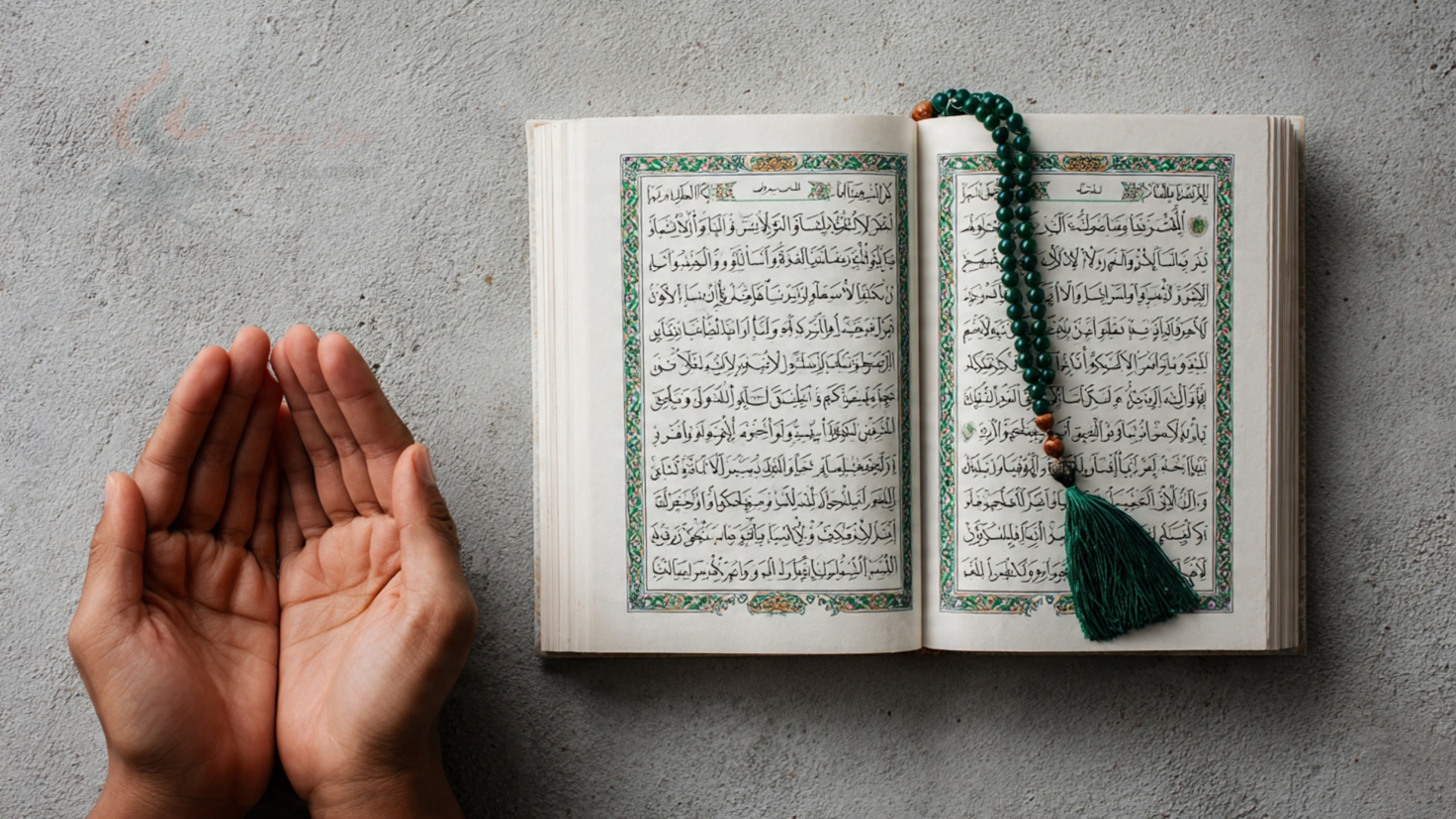Surah As-Saffat, the 37th chapter of the Qur’an, is a compelling tapestry of faith, obedience, and divine justice. The last 90 verses (from Ayah 93 to Ayah 182) are particularly rich in thematic depth and spiritual lessons. Through their dynamic structure, they present an eloquent call to faith and action, resonating across generations.
This blog examines the meanings, themes, and significance of these verses, providing insight into their enduring relevance for believers today.
Key Themes in the Last 90 Ayats of Surah As-Saffat
The Test of Prophet Ibrahim
The narrative of Prophet Ibrahim unfolds dramatically in Ayahs 99-113. This section highlights the ultimate test of faith and submission. Ibrahim’s unwavering commitment to Allah’s command, even when tasked with sacrificing his son, displays the pinnacle of trust in divine wisdom. Through this story, we glean a profound lesson about prioritizing faith over all attachments. The moment Allah provides a ram in place of the sacrifice signifies divine mercy and rewards for steadfast belief.
Recollection of Prophet Yunus
The incident of Prophet Yunus (Ayahs 139-148) offers a vivid example of repentance and divine forgiveness. After being swallowed by a large fish, Yunus calls out in despair, acknowledging his mistake. His plea, “There is no deity except You; exalted are You. Indeed, I have been of the wrongdoers,” becomes a timeless invocation for seeking forgiveness (37:143).
This segment reassures believers of Allah’s boundless mercy. It emphasizes the importance of turning to Him in times of distress, acknowledging our shortcomings, and seeking redemption.
Warnings to Disbelievers
The Ayats following the story outline the fate awaiting those who reject divine guidance. The vivid imagery of Hell (Ayahs 62-68) contrasts starkly with the bliss promised to the faithful. These warnings are not punitive tales but rather opportunities for reflection. They encourage self-accountability and a return to righteousness.
Praise for Believers
Ayahs 40-49 celebrate the reward of the righteous. Those who remain steadfast and devoted to Allah’s path enjoy blessings in paradise. These verses paint a picture of eternal joy, free from suffering, where believers enjoy spiritual and physical plenitude.
Unity in Worship
The latter Ayats (164-166) emphasize the unanimity among angels in submitting to Allah’s command. The verses remind humans of the importance of aligning with this celestial obedience. They caution against turning to idols or man-made philosophies, reaffirming that salvation lies in monotheism.

Surah Saffat Transliteration, English & Urdu Translation
بِسۡمِ ٱللَّهِ ٱلرَّحۡمَٰنِ ٱلرَّحِيمِ
Bismillah hir rahman nir raheem
In the name of Allah, the Entirely Merciful, the Especially Merciful.
مَا لَكُمۡ لَا تَنطِقُونَ-91
Maa lakum laa tantiqoon
What is [wrong] with you that you do not speak?”
فَرَاغَ عَلَيۡهِمۡ ضَرۡبَۢا بِٱلۡيَمِينِ-92
Faraagha ‘alaihim darbam bilyameen
And he turned upon them a blow with [his] right hand.
فَأَقۡبَلُوٓاْ إِلَيۡهِ يَزِفُّونَ-93
Fa aqbalooo ilaihi yaziffoon
Then the people came toward him, hastening.
قَالَ أَتَعۡبُدُونَ مَا تَنۡحِتُونَ-94
Qaala ata’budoona maa tanhitoon
He said, “Do you worship that which you [yourselves] carve,
وَٱللَّهُ خَلَقَكُمۡ وَمَا تَعۡمَلُونَ-95
Wallaahu khalaqakum wa maa ta’maloon
While Allah created you and that which you do?”
قَالُواْ ٱبۡنُواْ لَهُۥ بُنۡيَٰنٗا فَأَلۡقُوهُ فِي ٱلۡجَحِيمِ-96
Qaalub noo lahoo bun yaanan fa alqoohu fil jaheem
They said, “Construct for him a furnace and throw him into the burning fire.”
فَأَرَادُواْ بِهِۦ كَيۡدٗا فَجَعَلۡنَٰهُمُ ٱلۡأَسۡفَلِينَ-97
Fa araadoo bihee kaidan faja ‘alnaahumul asfaleen
And they intended for him a plan, but We made them the most debased.
وَقَالَ إِنِّي ذَاهِبٌ إِلَىٰ رَبِّي سَيَهۡدِينِ-98
Wa qaala innee zaahibun ilaa Rabbee sa yahdeen
And [then] he said, “Indeed, I will go to [where I am ordered by] my Lord; He will guide me.
رَبِّ هَبۡ لِي مِنَ ٱلصَّـٰلِحِينَ-99
Rabbi hab lee minas saaliheen
My Lord, grant me [a child] from among the righteous.”
فَبَشَّرۡنَٰهُ بِغُلَٰمٍ حَلِيمٖ-100
Fabashsharnaahu bighulaamin haleem
So we gave him good tidings of a forbearing boy.
فَلَمَّا بَلَغَ مَعَهُ ٱلسَّعۡيَ قَالَ يَٰبُنَيَّ إِنِّيٓ أَرَىٰ فِي ٱلۡمَنَامِ أَنِّيٓ أَذۡبَحُكَ فَٱنظُرۡ مَاذَا تَرَىٰۚ قَالَ يَـٰٓأَبَتِ ٱفۡعَلۡ مَا تُؤۡمَرُۖ-101 سَتَجِدُنِيٓ إِن شَآءَ ٱللَّهُ مِنَ ٱلصَّـٰبِرِينَ
Falamma balagha ma’a hus sa’ya qaala yaa buniya inneee araa fil manaami anneee azbahuka fanzur maazaa taraa; qaala yaaa abatif ‘al maa tu’maru satajidunee in shaaa’allaahu minas saabireen
And when he reached with him [the age of] exertion, he said, “O my son, indeed I have seen in a dream that I [must] sacrifice you, so see what you think.” He said, “O my father, do as you are commanded. You will find me, if Allah wills, of the steadfast.”
فَلَمَّآ أَسۡلَمَا وَتَلَّهُۥ لِلۡجَبِينِ-102
Falammaaa aslamaa wa tallahoo liljabeen
And when they had both submitted, and he put him down upon his forehead,
وَنَٰدَيۡنَٰهُ أَن يَـٰٓإِبۡرَٰهِيمُ-103
Wa naadainaahu ai yaaaa Ibraheem
We called to him, “O Abraham,
قَدۡ صَدَّقۡتَ ٱلرُّءۡيَآۚ إِنَّا كَذَٰلِكَ نَجۡزِي ٱلۡمُحۡسِنِينَ-104
Qad saddaqtar ru’yaa; innaa kazaalika najzil muhsineen
You have fulfilled the vision.” Indeed, we thus reward the doers of good.
إِنَّ هَٰذَا لَهُوَ ٱلۡبَلَـٰٓؤُاْ ٱلۡمُبِينُ-`105
Inna haazaa lahuwal balaaa’ul mubeen
Indeed, this was a clear trial.
وَفَدَيۡنَٰهُ بِذِبۡحٍ عَظِيمٖ-106
Wa fadainaahu bizibhin ‘azeem
And we ransomed him with a great sacrifice,
وَتَرَكۡنَا عَلَيۡهِ فِي ٱلۡأٓخِرِينَ-107
Wa taraknaa ‘alaihi fil aakhireen
And we left for him [favorable mention] among later generations:
سَلَٰمٌ عَلَىٰٓ إِبۡرَٰهِيمَ-108
Salaamun ‘alaaa Ibraaheem
“Peace upon Abraham.”
كَذَٰلِكَ نَجۡزِي ٱلۡمُحۡسِنِينَ-109
Kazaalika najzil muhsineen
Indeed, we thus reward the doers of good.
إِنَّهُۥ مِنۡ عِبَادِنَا ٱلۡمُؤۡمِنِينَ-110
Innahoo min ‘ibaadinal mu’mineen
Indeed, he was one of our believing servants.
وَبَشَّرۡنَٰهُ بِإِسۡحَٰقَ نَبِيّٗا مِّنَ ٱلصَّـٰلِحِينَ-111
Wa bashsharnaahu bi Ishaaqa Nabiyam minas saaliheen
And we gave him good tidings of Isaac, a prophet from among the righteous.
وَبَٰرَكۡنَا عَلَيۡهِ وَعَلَىٰٓ إِسۡحَٰقَۚ وَمِن ذُرِّيَّتِهِمَا مُحۡسِنٞ وَظَالِمٞ لِّنَفۡسِهِۦ مُبِينٞ-112
Wa baaraknaa ‘alaihi wa ‘alaaa Ishaaq; wa min zurriyya tihimaa muhsinunw wa zaalimul linafsihee mubeen (section 3)
And we blessed him and Isaac. But among their descendants is the doer of good and the unjust to himself.
وَلَقَدۡ مَنَنَّا عَلَىٰ مُوسَىٰ وَهَٰرُونَ-113
Wa laqad mananna alaa Moosaa wa Haaroon
And we did certainly confer favor upon Moses and Aaron.
وَنَجَّيۡنَٰهُمَا وَقَوۡمَهُمَا مِنَ ٱلۡكَرۡبِ ٱلۡعَظِيمِ-114
Wa najjainaahumaa wa qawmahumaa minal karbil ‘azeem
And we saved them and their people from the great affliction,
وَنَصَرۡنَٰهُمۡ فَكَانُواْ هُمُ ٱلۡغَٰلِبِينَ-115
Wa nasarnaahum fakaanoo humul ghaalibeen
And we supported them, so it was they who overcame.
وَءَاتَيۡنَٰهُمَا ٱلۡكِتَٰبَ ٱلۡمُسۡتَبِينَ-116
Wa aatainaahumal Kitaabal mustabeen
And we gave them the explicit Scripture,
وَهَدَيۡنَٰهُمَا ٱلصِّرَٰطَ ٱلۡمُسۡتَقِيمَ-117
Wa hadainaahumus Siraatal Mustaqeem
And we guided them on the straight path.
وَتَرَكۡنَا عَلَيۡهِمَا فِي ٱلۡأٓخِرِينَ-118
Wa taraknaa ‘alaihimaa fil aakhireen
And we left for them [favorable mention] among later generations:
سَلَٰمٌ عَلَىٰ مُوسَىٰ وَهَٰرُونَ-119
Salaamun ‘alaa Moosaa wa Haaroon
“Peace upon Moses and Aaron.”
إِنَّا كَذَٰلِكَ نَجۡزِي ٱلۡمُحۡسِنِينَ-120
Innaa kazaalika najzil muhsineen
Indeed, we thus reward the doers of good.
إِنَّهُمَا مِنْ عِبَادِنَا الْمُؤْمِنِينَ-121
Innahumaa min ‘ibaadinal mu’mineen
Indeed, they were of our believing servants.
وَإِنَّ إِلۡيَاسَ لَمِنَ ٱلۡمُرۡسَلِينَ-122
Wa inna Ilyaasa laminal mursaleen
And indeed, Elias was from among the messengers,
إِذۡ قَالَ لِقَوۡمِهِۦٓ أَلَا تَتَّقُونَ-123
Iz qaala liqawmiheee alaa tattaqoon
When he said to his people, “Will you not fear Allah?
أَتَدۡعُونَ بَعۡلٗا وَتَذَرُونَ أَحۡسَنَ ٱلۡخَٰلِقِينَ-124
Atad’oona Ba’lanw wa tazaroona ahsanal khaaliqeen
Do you call upon Ba’l and leave the best of creators –
ٱللَّهَ رَبَّكُمۡ وَرَبَّ ءَابَآئِكُمُ ٱلۡأَوَّلِينَ-125
Allaaha Rabbakum wa Rabba aabaaa’ikumul awwaleen
Allah, your Lord and the Lord of your first forefathers?”
فَكَذَّبُوهُ فَإِنَّهُمۡ لَمُحۡضَرُونَ-126
Fakazzaboohu fa inna hum lamuhdaroon
And they denied him, so indeed, they will be brought [for punishment],
إِلَّا عِبَادَ ٱللَّهِ ٱلۡمُخۡلَصِينَ-127
Illaa ‘ibaadal laahil mukhlaseen
Except the chosen servants of Allah.
وَتَرَكۡنَا عَلَيۡهِ فِي ٱلۡأٓخِرِينَ-128
Wa taraknaa ‘alaihi fil aakhireen
And we left for him [favorable mention] among later generations:
سَلَٰمٌ عَلَىٰٓ إِلۡيَاسِينَ-129
Salaamun ‘alaaa Ilyaaseen
“Peace upon Elias.”
إِنَّا كَذَٰلِكَ نَجۡزِي ٱلۡمُحۡسِنِينَ-130
Innaa kazaalika najzil muhsineen
Indeed, we thus reward those who do good.
إِنَّهُۥ مِنۡ عِبَادِنَا ٱلۡمُؤۡمِنِينَ-131
Innahoo min ‘ibaadinal mu’mineen
Indeed, he was one of our believing servants.
وَإِنَّ لُوطٗا لَّمِنَ ٱلۡمُرۡسَلِينَ-132
Wa inna Lootal laminal mursaleen
And indeed, Lot was among the messengers.
إِذۡ نَجَّيۡنَٰهُ وَأَهۡلَهُۥٓ أَجۡمَعِينَ-133
Iz najjainaahu wa ahlahooo ajma’een
[So mention] when We saved him and his family, all,
إِلَّا عَجُوزٗا فِي ٱلۡغَٰبِرِينَ-134
Illaa ‘ajoozan fil ghaabireen
Except his wife among those who remained [with the evildoers].
ثُمَّ دَمَّرۡنَا ٱلۡأٓخَرِينَ-135
Summa dammarnal aakhareen
Then we destroyed the others.
وَإِنَّكُمۡ لَتَمُرُّونَ عَلَيۡهِم مُّصۡبِحِينَ-136
Wa innakum latamurroona ‘alaihim musbiheen
And indeed, you pass by them in the morning
وَبِٱلَّيۡلِۚ أَفَلَا تَعۡقِلُونَ-137
Wa billail; afalaa ta’qiloon
And at night. Then will you not use reason?
وَإِنَّ يُونُسَ لَمِنَ ٱلۡمُرۡسَلِينَ-138
Wa inna Yoonusa laminal mursaleen
And indeed, Jonah was among the messengers.
إِذۡ أَبَقَ إِلَى ٱلۡفُلۡكِ ٱلۡمَشۡحُونِ-139
Iz abaqa ilal fulkil mash hoon
[Mention] when he ran away to the laden ship.
فَسَاهَمَ فَكَانَ مِنَ ٱلۡمُدۡحَضِينَ-140
Fasaahama fakaana minal mudhadeen
And he drew lots and was among the losers.
فَٱلۡتَقَمَهُ ٱلۡحُوتُ وَهُوَ مُلِيمٞ-141
Faltaqamahul hootu wa huwa muleem
Then the fish swallowed him, while he was blameworthy.
فَلَوۡلَآ أَنَّهُۥ كَانَ مِنَ ٱلۡمُسَبِّحِينَ-142
Faltaqamahul hootu wa huwa muleem
Then the fish swallowed him, while he was blameworthy.
فَلَوۡلَآ أَنَّهُۥ كَانَ مِنَ ٱلۡمُسَبِّحِينَ-143
Falaw laaa annahoo kaana minal musabbiheen
And had he not been of those who exalt Allah,
لَلَبِثَ فِي بَطۡنِهِۦٓ إِلَىٰ يَوۡمِ يُبۡعَثُونَ-144
Lalabisa fee batniheee ilaa Yawmi yub’asoon
He would have remained inside its belly until the Day they are resurrected.
145-۞فَنَبَذۡنَٰهُ بِٱلۡعَرَآءِ وَهُوَ سَقِيمٞ
Fanabaznaahu bil’araaa’i wa huwa saqeem
But we threw him onto the open shore while he was ill.
وَأَنۢبَتۡنَا عَلَيۡهِ شَجَرَةٗ مِّن يَقۡطِينٖ-146
Wa ambatnaa ‘alaihi shajaratam mai yaqteen
And we caused him to grow over him.
وَأَرۡسَلۡنَٰهُ إِلَىٰ مِاْئَةِ أَلۡفٍ أَوۡ يَزِيدُونَ-147
Wa arsalnaahu ilaa mi’ati alfin aw yazeedoon
And we sent him to [his people of] a hundred thousand or more.
فَـَٔامَنُواْ فَمَتَّعۡنَٰهُمۡ إِلَىٰ حِينٖ-148
Fa aamanoo famatta’ naahum ilaa heen
And they believed, so We gave them enjoyment [of life] for a time.
فَٱسۡتَفۡتِهِمۡ أَلِرَبِّكَ ٱلۡبَنَاتُ وَلَهُمُ ٱلۡبَنُونَ-149
Fastaftihim ali Rabbikal banaatu wa lahumul banoon
So inquire of them, [O Muhammad], “Does your Lord have daughters while they have sons?
أَمۡ خَلَقۡنَا ٱلۡمَلَـٰٓئِكَةَ إِنَٰثٗا وَهُمۡ شَٰهِدُونَ-150
Am khalaqnal malaaa’i kata inaasanw wa hum shaahidoon
Or did we create the angels as females while they were witnesses?”
أَلَآ إِنَّهُم مِّنۡ إِفۡكِهِمۡ لَيَقُولُونَ-151
Alaaa innahum min ifkihim la yaqooloon
Unquestionably, it is out of their [invented] falsehood that they say,
وَلَدَ ٱللَّهُ وَإِنَّهُمۡ لَكَٰذِبُونَ-152
Waladal laahu wa innahum lakaaziboon
” Allah has begotten,” and indeed, they are liars.
أَصۡطَفَى ٱلۡبَنَاتِ عَلَى ٱلۡبَنِينَ-153
Astafal banaati ‘alal baneen
Has He chosen daughters over sons?
مَا لَكُمۡ كَيۡفَ تَحۡكُمُونَ-154
Maa lakum kaifa tahkumoon
What is [wrong] with you? How do you make a judgment?
أَفَلَا تَذَكَّرُونَ-155
Afalaa tazakkaroon
Then will you not be reminded?
أَمۡ لَكُمۡ سُلۡطَٰنٞ مُّبِينٞ-156
Am lakum sultaanum mubeen
Or do you have a clear authority?
فَأۡتُواْ بِكِتَٰبِكُمۡ إِن كُنتُمۡ صَٰدِقِينَ-157
Faatoo bi Kitaabikum in kuntum saadiqeen
Then produce your scripture, if you should be truthful.
وَجَعَلُواْ بَيۡنَهُۥ وَبَيۡنَ ٱلۡجِنَّةِ نَسَبٗاۚ وَلَقَدۡ عَلِمَتِ ٱلۡجِنَّةُ إِنَّهُمۡ لَمُحۡضَرُونَ-158
Wa ja’aloo bainahoo wa bainal jinnati nasabaa; wa laqad ‘alimatil jinnatu innahum lamuhdaroon
And they have claimed between Him and the jinn a lineage, but the jinn have already known that they [who made such claims] will be brought to [punishment].
سُبۡحَٰنَ ٱللَّهِ عَمَّا يَصِفُونَ-159
Subhaanal laahi ‘ammaa yasifoon
Exalted is Allah above what they describe,
إِلَّا عِبَادَ ٱللَّهِ ٱلۡمُخۡلَصِينَ-160
Illaa ‘ibaadal laahil mukhlaseen
Except the chosen servants of Allah [who do not share in that sin].
فَإِنَّكُمۡ وَمَا تَعۡبُدُونَ-161
Fa innakum wa maa ta’budoon
So indeed, you [disbelievers] and whatever you worship,
مَآ أَنتُمۡ عَلَيۡهِ بِفَٰتِنِينَ-162
Maaa antum ‘alaihi bi faaatineen
You cannot tempt [anyone] away from Him
إِلَّا مَنۡ هُوَ صَالِ ٱلۡجَحِيمِ-163
Illaa man huwa saalil jaheem
Except he who is to [enter and] burn in the Hellfire.
وَمَا مِنَّآ إِلَّا لَهُۥ مَقَامٞ مَّعۡلُومٞ-163
Wa maa minnaaa illaa lahoo maqaamun ma’loom
[The angels say], “There is not among us any except that he has a known position.
وَإِنَّا لَنَحۡنُ ٱلصَّآفُّونَ-164
Wa innaa lanah nus saaffoon
And indeed, we are those who line up [for prayer].
وَإِنَّا لَنَحۡنُ ٱلۡمُسَبِّحُونَ-165
Wa innaa lanah nul musabbihoon
And indeed, we are those who exalt Allah.”
وَإِن كَانُواْ لَيَقُولُونَ-166
Wa in kaanoo la yaqooloon
And indeed, the disbelievers used to say,
لَوۡ أَنَّ عِندَنَا ذِكۡرٗا مِّنَ ٱلۡأَوَّلِينَ-167
Law anna ‘indanaa zikram minal awwaleen
“If we had a message from [those of] the former peoples,
لَكُنَّا عِبَادَ ٱللَّهِ ٱلۡمُخۡلَصِينَ-168
Lakunna ‘ibaadal laahil mukhlaseen
We would have been the chosen servants of Allah.”
فَكَفَرُواْ بِهِۦۖ فَسَوۡفَ يَعۡلَمُونَ-169
Fakafaroo bihee fasawfa ya’lamoon
But they disbelieved in it, so they are going to know.
وَلَقَدۡ سَبَقَتۡ كَلِمَتُنَا لِعِبَادِنَا ٱلۡمُرۡسَلِينَ-170
Wa laqad sabaqat Kalimatunaa li’ibaadinal mursa leen
And Our word has already preceded for Our servants, the messengers,
إِنَّهُمۡ لَهُمُ ٱلۡمَنصُورُونَ-171
Innaa hum lahumul mansooroon
[Indeed, they would be those given victory
وَإِنَّ جُندَنَا لَهُمُ ٱلۡغَٰلِبُونَ-172
Wa inna jundana lahumul ghaaliboon
And that indeed, our soldiers will be those who overcome.
فَتَوَلَّ عَنۡهُمۡ حَتَّىٰ حِينٖ-173
Fatawalla ‘anhum hatta heen
So, [O Muhammad], leave them for a time.
وَأَبۡصِرۡهُمۡ فَسَوۡفَ يُبۡصِرُونَ–174
Wa absirhum fasawfa yubsiroon
And see [what will befall] them, for they are going to see.
أَفَبِعَذَابِنَا يَسۡتَعۡجِلُونَ-175
Afabi’azaabinaa yasta’jiloon
Then, for our punishment, are they impatient?
فَإِذَا نَزَلَ بِسَاحَتِهِمۡ فَسَآءَ صَبَاحُ ٱلۡمُنذَرِينَ-176
Fa izaa nazala bisaahatihim fasaaa’a sabaahul munzareen
But when it descends in their territory, then evil is the morning of those who were warned.
وَتَوَلَّ عَنۡهُمۡ حَتَّىٰ حِينٖ-177
Wa tawalla ‘anhum hattaa heen
And leave them for a time.
وَأَبۡصِرۡ فَسَوۡفَ يُبۡصِرُونَ-178
Wa absir fasawfa yubsiroon
And see, for they are going to see.
سُبۡحَٰنَ رَبِّكَ رَبِّ ٱلۡعِزَّةِ عَمَّا يَصِفُونَ-179
Subhaana Rabbika Rabbil ‘izzati ‘amma yasifoon
Exalted is your Lord, the Lord of might, above what they describe.
وَسَلَٰمٌ عَلَى ٱلۡمُرۡسَلِينَ-180
Wa salaamun ‘alalmursaleen
And peace upon the messengers.
وَٱلۡحَمۡدُ لِلَّهِ رَبِّ ٱلۡعَٰلَمِينَ-181
Walhamdu lillaahi Rabbil ‘aalameen (section 5)
And praise to Allah, Lord of the worlds.
Key Lessons from the Last Verses
Faith and Surrender
The last verses underscore faith as the foundation of success. Whether through Ibrahim’s trial or Yunus’s repentance, the message is clear. True submission involves unwavering trust in Allah’s plans, regardless of immediate outcomes.
Reflection and Accountability
These verses urge self-reflection. By detailing the consequences of disbelief and sin, they push us to evaluate our actions and redirect our lives toward piety.
Mercy and Forgiveness
The Qur’an repeats one message consistently—Allah forgives those who turn to Him with sincere hearts. The stories in Surah As-Saffat remind believers that even in failure, there is hope for redemption.
The Victory of Truth
Throughout these Ayats, Allah reassures the faithful that truth will always prevail. This promise inspires resilience and fortitude in the face of challenges.
Significance of Surah Saffat Today
The last 90 Ayats of Surah As-Saffat remind us of a higher purpose and eternal accountability. They call for realigning our priorities, shedding arrogance, and recognizing our dependence on Allah.
Today’s fast-paced life tests faith in unique ways. These verses urge us to pause, reflect, and strengthen our connection with the divine. By recounting the challenges faced by prophets, they instill hope and endurance in us. They encourage believers to hold steadfastly to truth, even when societal trends push toward moral compromise.
Relevance Across Generations
These Ayats transcend their historical context. Prophet Ibrahim’s sacrifice resonates universally, symbolizing the balance between holding onto worldly ties and our duty to Allah.
The warnings against disbelief hold in a world increasingly distant from spirituality. The focus on paradise as the ultimate reward motivates a life centered around ethics, service, and devotion.
A Unique Perspective on the Verses
The last 90 Ayats of Surah As-Saffat offer a spiritual roadmap for any era. Beyond simply recounting events, they trigger an emotional and intellectual response. They challenge us to reimagine our existence, not as confined to fleeting worldly gains but as part of an eternal narrative with Allah at the center.
Their blend of warnings and promises cultivates specific attributes in believers—faith, courage, humility, and perseverance. These are the qualities needed to face the evolving challenges of a complex, globalized world.
Conclusion
The last 90 Ayats of Surah As-Saffat encapsulate divine wisdom. They inspire unwavering trust in Allah’s plans, regardless of challenges. They remind us of the mercy awaiting those who seek forgiveness, the consequences of straying from truth, and the eternal joy promised to believers.
These Ayats serve as a powerful anchor in a rapidly shifting world. They reassure that despite chaos or adversity, devotion to Allah ensures success. Their lessons, timeless in depth and clarity, provide a resilient shield against moral and spiritual decay.
Surah As-Saffat calls us to lift our gaze beyond the immediate horizon. Its stories and messages invite us to lead purposeful lives rooted in faith and submission. By internalizing their essence, we move closer to becoming communities and individuals who embody the true spirit of Islam. May these verses continue to guide and enlighten believers for generations to come.




